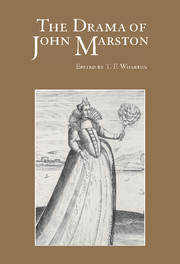Book contents
- Frontmatter
- Contents
- Notes on contributors
- Acknowledgements
- Note on the text
- Introduction
- 1 John Marston at the ‘mart of woe’: the Antonio plays
- 2 John Marston: a theatrical perspective
- 3 Varieties of fantasy in What You Will
- 4 Safety in fiction: Marston's recreational poetics
- 5 Insatiate punning in Marston's courtesan plays
- 6 Touching the self: masturbatory Marston
- 7 ‘Two parts in one’: Marston and masculinity
- 8 The Malcontent: hunting the letter
- 9 The Dutch Courtesan and the profits of translation
- 10 Sexual politics in Marston's The Malcontent
- 11 Marston: censure, censorship, and free speech
- 12 Ill-mannered Marston
- Index
10 - Sexual politics in Marston's The Malcontent
Published online by Cambridge University Press: 01 October 2009
- Frontmatter
- Contents
- Notes on contributors
- Acknowledgements
- Note on the text
- Introduction
- 1 John Marston at the ‘mart of woe’: the Antonio plays
- 2 John Marston: a theatrical perspective
- 3 Varieties of fantasy in What You Will
- 4 Safety in fiction: Marston's recreational poetics
- 5 Insatiate punning in Marston's courtesan plays
- 6 Touching the self: masturbatory Marston
- 7 ‘Two parts in one’: Marston and masculinity
- 8 The Malcontent: hunting the letter
- 9 The Dutch Courtesan and the profits of translation
- 10 Sexual politics in Marston's The Malcontent
- 11 Marston: censure, censorship, and free speech
- 12 Ill-mannered Marston
- Index
Summary
When Marston returned to the theatre after a three-year hiatus, with a new company and a new play – The Malcontent – the territory he explored in that play – sex and violence – must have seemed familiar to those who remembered him. His earlier work's invariable domain is the power of women to arouse, sometimes innocently, sometimes not, these destructive twin passions. It is not that ‘wanton jigga-joggies’ (The Dutch Courtesan v.iii.184), so ubiquitous in The Malcontent and later plays, are rampant in the earlier ones. Certainly, though, when an earlier Marston play included a widow seemingly eager to re-marry, or the occasional virgin who seemed willing to let her two suitors ‘sheath both [their] weapons in [her]’ (Jack Drum's Entertainment III.208), this had been enough to excite a frenzy of erotic and destructive passion. Unfortunately, since the females in these plays were greatly outnumbered by those who pursued them, and the competition was further heightened (at least in Jack Drum's Entertainment and What You Will) by the presence of over-sexed French rivals, arousal was mostly doomed to end in the worst male nightmares: of cuckoldry, rejection, and humiliation. A husband – even a loving one like Albano – could be left vainly wailing up at his wife's window, ‘Celia, open, open Celia, I would enter, open Celia’ (What You Will IV.i.1651); or be told to his face by the Frenchman who has just cuckolded him, ‘by gor, de most delicat plump vench dat ever mee tuche’ (Jack Drum's Entertainment III.239).
- Type
- Chapter
- Information
- The Drama of John MarstonCritical Re-Visions, pp. 181 - 193Publisher: Cambridge University PressPrint publication year: 2001

